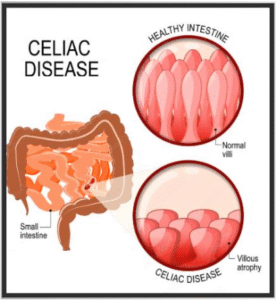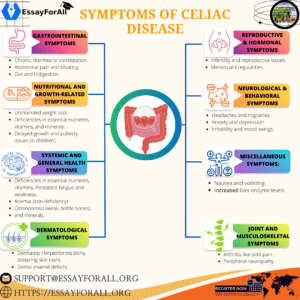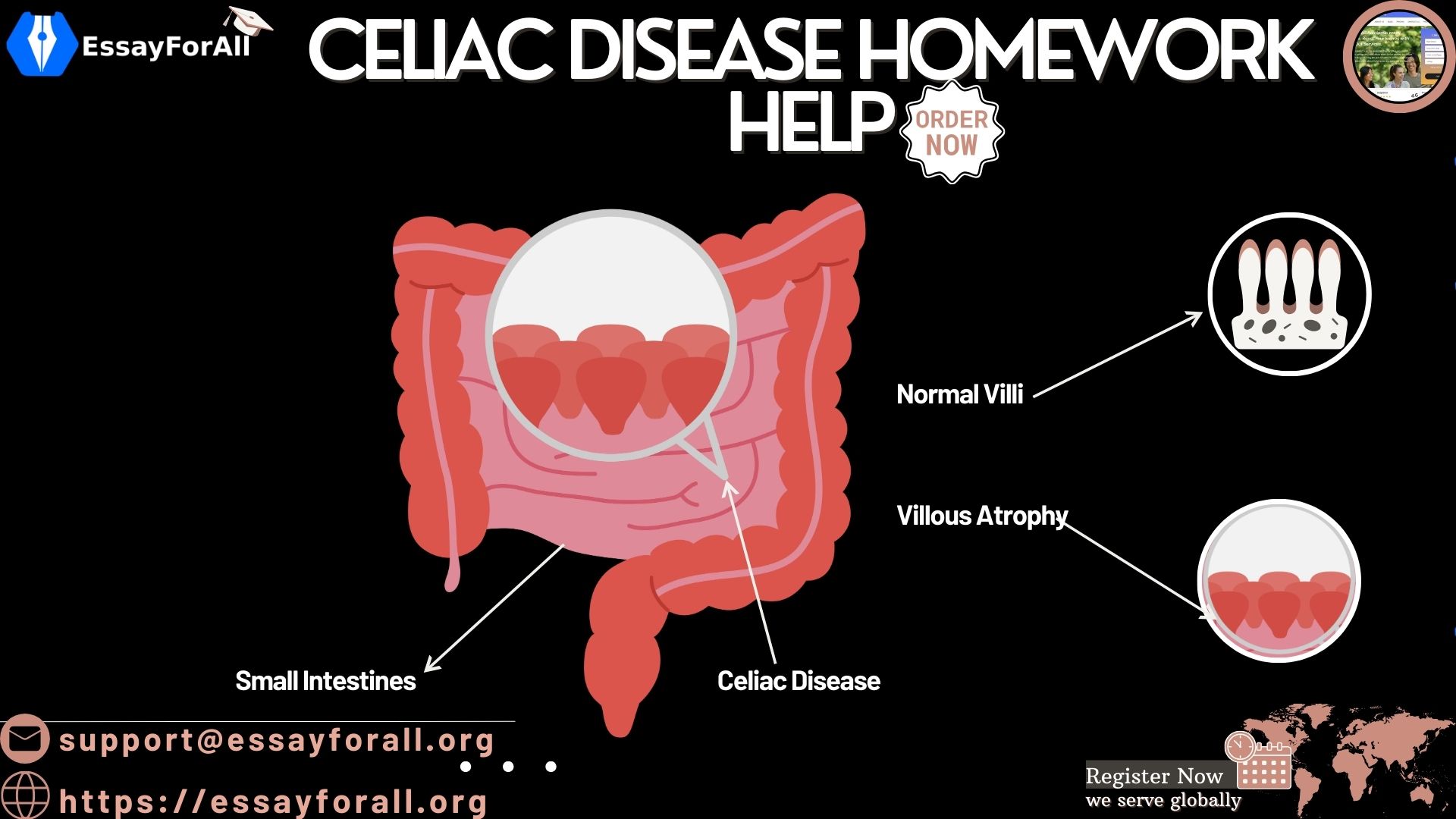
Celiac disease is a long-term autoimmune and digestive disorder that affects the small intestine when a person consumes gluten-containing foods. Gluten is a naturally occurring protein found in grains such as wheat, barley, and rye. For individuals with celiac disease, the immune system reacts abnormally to gluten, causing inflammation and damage to the lining of the small intestine, specifically the villi.
Villi are tiny finger-shaped projections responsible for absorbing nutrients from digested food. When these villi are damaged, the absorption capacity of the small intestine reduces significantly, leading to malnutrition and a wide range of systemic health complications.
At Essay For All, we offer high-quality celiac disease Homework Help support aimed at helping learners understand the condition comprehensively, not only from a biological perspective but also from a nursing care and management standpoint. Our tutors have extensive experience guiding nursing students through academic, clinical, and applied questions connected to gastrointestinal and autoimmune disorders.
Overview of Celiac Disease
Celiac disease is classified as an autoimmune condition because it involves the body’s immune system mistakenly attacking healthy tissue. When gluten is ingested, the immune response triggers an inflammatory reaction that damages the mucosal surface of the small intestine. The result is a gradual breakdown of villi, reducing the ability of the body to absorb nutrients such as proteins, fats, vitamins, and minerals.
Gluten contributes to the texture and elasticity of baked products, which explains why it is commonly used in bread, pastries, cereals, and pasta. For an individual with celiac disease, even small amounts of gluten can cause harm. It is therefore not a condition that can be managed casually; strict dietary adherence is required for life.
Importantly, celiac disease should not be confused with gluten intolerance or wheat allergy. Gluten intolerance involves difficulty digesting gluten without triggering an autoimmune response. A wheat allergy, on the other hand, involves an allergic immune response that may cause swelling, skin reactions, or breathing difficulties. Celiac disease is distinct because it causes structural damage to the small intestine.
Symptoms of Celiac Disease
The symptoms of celiac disease can vary widely, and some individuals may experience the condition for many years without being diagnosed. While the condition primarily affects the digestive tract, it can produce symptoms in multiple body systems due to poor nutrient absorption.
Common symptoms include:
- Bloating and abdominal pain
- Chronic diarrhoea or constipation
- Nausea and vomiting
- Pale, greasy, and foul-smelling stool
- Disturbed appetite and weight loss
- Mouth ulcers
- Iron-deficiency anaemia
- Persistent fatigue
- Development of osteoporosis or fragile bones
- Delayed growth in children
- Infertility or menstrual irregularities
- Tingling or numbness in the extremities due to nerve involvement
Because these symptoms may resemble those of other gastrointestinal disorders, celiac disease is often misdiagnosed or detected late. In some individuals, symptoms remain mild despite ongoing internal damage, increasing the risk of serious complications later in life.

Risk Factors
Although celiac disease can occur in any person, certain factors increase the likelihood of developing the condition. These include:
- Family history of celiac disease
- Type 1 diabetes
- Autoimmune thyroid disease
- Addison’s disease
- Down syndrome
- Microscopic colitis
- Autoimmune hepatitis
- Irritable bowel syndrome in some individuals
Women tend to be diagnosed more frequently than men, though the condition affects all genders and any age group.
Pathophysiology
When gluten is ingested, it passes through the digestive tract and reaches the small intestine. In individuals with celiac disease, fragments of gluten trigger the activation of immune system cells. These cells release inflammatory substances that target the villi, gradually wearing them down. As villi flatten and shrink, the internal surface area of the small intestine reduces, limiting nutrient absorption.
This disruption leads to deficiencies in essential nutrients such as iron, calcium, folate, fat-soluble vitamins, and protein. Over time, the consequences include bone fragility, delayed healing, weakened immunity, neurological disorders, and impaired growth in children.
Diagnosis
Diagnosis requires careful assessment because the symptoms may resemble other digestive disorders. The most common diagnostic methods include:
- Blood Tests – To detect antibodies associated with autoimmune reactions to gluten.
- Endoscopy with Small Intestine Biopsy – To confirm villi damage.
- Genetic Testing – Sometimes used to support diagnosis in unclear cases.
It is important that patients continue consuming gluten before testing; removing gluten prematurely may produce false-negative results.
Complications of Untreated Celiac Disease
If celiac disease is not identified and managed appropriately, several complications may develop.
Malnutrition
Damage to the villi reduces nutrient absorption. Over time, this results in deficiencies that affect muscle strength, wound healing, immune function, and mental focus. Severe malnutrition may present with visible weight loss, dry skin, weak hair, sunken eyes, and fatigue.
Dermatitis Herpetiformis
This is a skin condition associated with celiac disease, characterised by a persistent, itchy, blistering rash. It can appear on the elbows, knees, scalp, and lower back. People with dermatitis herpetiformis often require both dietary treatment and medication.
Lactose Intolerance
Damage to the small intestine may limit the digestion of lactose. In such cases, dairy products may cause nausea, gas, bloating, and diarrhoea. This may improve after the intestine heals following the adoption of a gluten-free diet.
Dietary and Lifestyle Management
The main treatment for celiac disease is maintaining a strict gluten-free diet for life.
Patients should avoid all foods containing wheat, barley, and rye, as well as products made from them. It is important to pay attention to processed foods, sauces, seasonings, and packaged snacks because gluten can be used as a stabilising or thickening ingredient.
Safe alternatives include:
- Brown or white rice
- Millet
- Corn
- Quinoa
- Gluten-free oats
- Pasta made from lentils, rice, or chickpeas
Practical Challenges
Patients must be educated on reading food labels carefully and asking about ingredients when eating outside the home. In households where some family members consume gluten, kitchen tools may need separation to avoid contamination.
Nursing Roles in the Care of Individuals with Celiac Disease
Nurses have a central role in supporting patients with celiac disease. Key responsibilities include:
- Assessing patient symptoms, nutritional status, and lifestyle habits
- Educating patients and families on gluten-free food options
- Demonstrating how to read ingredient labels accurately
- Advising on meal planning and safe food preparation practices
- Monitoring weight trends and signs of nutrient deficiency
- Encouraging follow-up with a dietician
- Providing emotional support during lifestyle adjustments
- Assisting parents of affected children to communicate dietary requirements to schools
Because dietary adherence can be challenging, nurses help patients develop routines that are realistic, affordable, and socially manageable.
Case Scenario
A 28-year-old woman presents with ongoing fatigue, abdominal discomfort, and unintentional weight loss. She reports that her symptoms worsen after eating bread or chapati. Laboratory tests reveal iron-deficiency anaemia. Further antibody testing returns positive, and a biopsy confirms villi damage. Following diagnosis, she receives dietary counselling and begins a gluten-free diet. Within six months, her symptoms improve, and her weight stabilises.
This scenario reflects the importance of recognising patterns and providing timely intervention.
Support Beyond Diet
Celiac disease affects daily living, social interactions, personal confidence, and emotional well-being. Patients may struggle when attending social gatherings or eating in public. Nurses and healthcare professionals should therefore support psychological coping strategies and encourage participation in peer support groups.
Why Choose Essay For All
- Professional academic guidance
- Reliable support from experienced tutors
- Respect for privacy and confidentiality
- Original, plagiarism-free work
- Around-the-clock availability
- Attention to detail and academic accuracy
